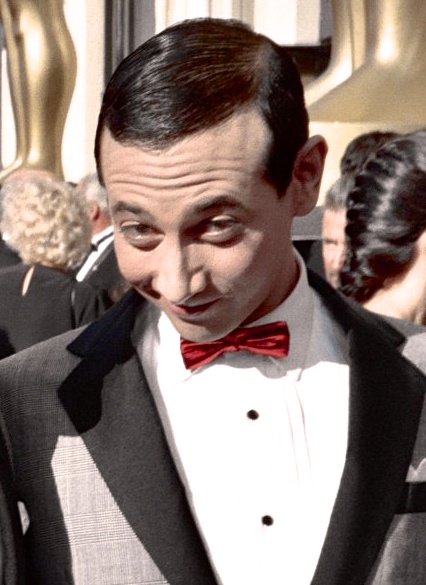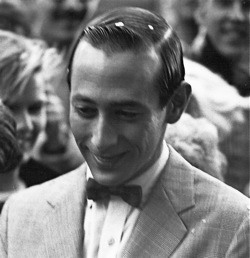BIOGRAPHICAL DETAILS
Description: Comic fictional character
Known For: Created and portrayed by American comedian Paul Reubens
Location: United States of America
Photo Comments: The above image is intended for those who wish to reuse material (text and/or graphics) from the Wikimedia projects — on their own website, in print, or otherwise. It focuses on Commons as this is explicitly a collection of reusable media.
CONTACT DETAILS
Official website
Other links seen below:
YOUTUBE
BIOGRAPHICAL PROFILE
Pee-wee Herman
Pee-wee Herman is a comic fictional character created and portrayed by American comedian Paul Reubens. He is best known for his two television series and film series during the 1980s. The childlike Pee-wee Herman character developed as a stage act that quickly led to an HBO special in 1981. As the stage performance gained further popularity, Reubens took the character to motion picture with Pee-wee’s Big Adventure in 1985, toning down the adult innuendo for the appeal of children. This paved the way for Pee-wee’s Playhouse, an Emmy Award winning children’s series that ran on CBS from 1986–91. Another film, Big Top Pee-wee, was released in 1988.
Due to negative media attention following a scandal in 1991, Reubens decided to shelve his alter ego during the 1990s, and then gradually resurrected it during the following decade. It was at that time that Reubens addressed plans to write a new Pee-wee film, Pee-wee’s Playhouse: The Movie. In June 2007, Reubens appeared as Pee-wee Herman for the first time since 1991 at Spike TV’s Guys’ Choice Awards.
In the 1970s, Reubens joined the Los Angeles-based improvisational comedy team The Groundlings and remained a member for six years, working with Bob McClurg, John Paragon, Susan Barnes, and Phil Hartman. Hartman and Reubens became close friends, often writing and working on material together. Reubens wrote sketches, developed his improvisational skills and, with Hartman, he developed the Pee-wee Herman character.
In 1977, The Groundlings staged a performance in which its members created characters one might see in a comedy club. Reubens decided to play a guy that everyone immediately knew would never make it as a comic, partly because Reubens couldn’t remember jokes in real life – he had trouble remembering punch lines and couldn’t properly piece information in sequential order. Pee-wee Herman was born that night, his distinctive guttural, “Ha Ha,” followed by a low, “Heh Heh Heh,” laugh became the character’s catch phrase, as did his insult comeback, “I know you are, but what am I?”
Pee-wee Herman’s signature grey glen plaid suit was originally a custom-made suit that Reubens had borrowed from the Groundlings director, Gary Austin; the small red bow tie was given to him by an acquaintance. Pee-wee’s later checkered clothing and persona were largely lifted from manic 1950s children’s TV host Pinky Lee.[2] Also incorporated into the look were short black hair, pale skin with red rouge, and red lipstick.
The inspiration for the name came from a Pee-weiny herman brand miniature harmonica and the surname of an energetic boy Reubens knew from his youth. Reubens thought the name Pee-wee Herman was a name that sounded too real to be made up, and like a real name a parent would give a child that they didn’t really care about.
Character background and personality
Throughout his film and television programs, Pee-wee Herman’s background has remained relatively ambiguous. During interviews, he has been portrayed as though he is a real life stand-up comedian who expanded his career by playing himself in his films and TV series. This is echoed by the fact that a star on the Hollywood Walk of Fame was awarded to Pee-wee Herman rather than Paul Reubens.
In both Pee-wee’s Big Adventure and Pee-wee’s Playhouse, the character surrounds himself with strange inventions and decorations and has no visible means of support, whereas Big Top Pee-wee depicts him as a farmer/inventor. During a June 1984 segment on Late Night with David Letterman, Pee-wee said that he has a sister named Hermione (who was a Girl Scout), his mother’s name is Honny Herman, and his father’s name is Herman Herman. He went on to say that everyone in his family has a first name that begins with an “H” except for him. This was again stated during a 1988 special which elaborated that Pee-wee was raised in Florida.
Pee-wee is commonly portrayed as an impatient and fun-loving child with dainty, effeminate mannerisms and quirky facial expressions. His age has never been explicitly stated; although, he once proclaimed on The Pee-wee Herman Show, “I’m the luckiest boy in the world”. David Letterman once said of the character, “What makes me laugh … is that it has the external structure of a bratty little precocious kid, but you know it’s being controlled by the incubus – the manifestation of evil itself”. While the character is typically cheerful and flamboyant, Pee-wee has indeed displayed an aggressive side, including his vicious pool battle with Francis in Pee-wee’s Big Adventure. He also played vengeful tricks in the aforementioned film and occasionally threw childish tantrums on Pee-wee’s Playhouse.
1980–92
The Pee-wee Herman Show
Main article: The Pee-wee Herman Show
Paul Reubens auditioned for Saturday Night Live for the 1980–81 season but was not accepted into the cast. Instead, he started a stage show with the Herman character, which made one of his first appearances in the 1980 film Cheech & Chong’s Next Movie. He first plays a rude receptionist in the film, spewing obscenities at police and being arrested. The character is later introduced as Pee-wee Herman, approaching the stage just before disputing with the film’s title characters again. Shortly after the film, Reubens took Pee-wee to the real stage. Originally, Reubens imbued Pee-wee with sexuality that was later toned down as the character made the transition from raucous night club to children’s television (though innuendo was still apparent, particularly between the Cowboy Curtis and Miss Yvonne characters). The stage show was popularized by HBO when The Pee-wee Herman Show aired in 1981.
The show featured the writing and acting of Groundlings alumni Phil Hartman and John Paragon, who would both reprise their characters on Pee-wee’s Playhouse. The Pee-wee Herman Show played for five sellout months at The Roxy Theatre in L.A., whereupon HBO filmed it and aired it as a special on September 11, 1981.
Following the success of The Pee-wee Herman Show, in the early and mid-1980s Reubens made several guest appearances on Late Night with David Letterman as Pee-wee Herman. These performances gave Pee-wee an even bigger following than he had with his HBO special. In 1983, Pee-wee Herman traveled the United States with The Pee-wee Herman Show, making highly publicized stops at the Guthrie Theatre in Minneapolis and Caroline’s in New York City. Reubens also appeared on an episode of the popular television show Mork & Mindy in 1981.
In 1984 Pee-wee Herman sold out New York City’s Carnegie Hall. Reubens went on to say that it was his appearances on David Letterman’s show that made Pee-wee a star.
: Pee-wee’s Big Adventure
While on the Warner Bros. lot, Reubens noticed that most of the people rode around on bicycles, and asked when he would get his. Warner Bros. presented him with a refurbished 1940s Schwinn; Reubens then abandoned the Pee-wee Herman script he had been writing, which was to have been a retelling of Pollyanna. He began writing about Herman’s love for his bike and his efforts to locate it once it was stolen. Hartman, Reubens, and Michael Varhol co-wrote the script for Pee-wee’s Big Adventure, basing the story loosely on Vittorio De Sica’s The Bicycle Thief. The film would be directed by a young Tim Burton, as his feature film debut, and scored by Danny Elfman. It was released August 9, 1985 and, while receiving mixed reviews, performed well at the box office and would become a cult film. Reubens was the originator of the “Pee-wee dance” in the movie, and he had performed it publicly many times prior to making the film.
Pee-wee hosted the 198th episode of Saturday Night Live on November 23, 1985. Phil Hartman, who would become an SNL cast member the following year, was credited for writing the “Pee-wee Herman Thanksgiving Special” sketch and appeared as a pilgrim in it.
The Pee-wee Herman character has received various honors, particularly during his peak fame in the late 1980s. During the original run of Pee-wee’s Playhouse, the series garnered 22 Emmy Awards. Pee-wee Herman was also awarded a star on the Hollywood Walk of Fame in 1988. Under the category of motion pictures, it can be found at 6562 Hollywood Blvd. The character also appeared on three covers of Rolling Stone, including issue 493 (February 1987), 614 (October 1991) with a cover story of “Who Killed Pee-wee Herman?,” and finally 619/620 (December 1991) for the 1991 Yearbook.
In the 1986 film Flight of the Navigator, directed by Randal Kleiser, who would later direct Big Top Pee-wee, Pee-wee’s characteristic laugh is uttered several times by the Trimaxian Drone (Max, voiced by Reubens), after he “contracted” emotions and 1980s knowledge from David. This persona, speaking in altered pitch similar to Pee-wee, persists for the rest of the movie, a stark contrast to Max’s original HAL 9000-esque tone.
Shortly after Reubens’s 1991 arrest, Jim Carrey impersonated Pee-wee Herman on the FOX sketch comedy series In Living Color. Later, rapper Eminem would imitate Herman in the song “Just Lose It”, copying his trademark laugh and even dressing as the character in the music video.
While the Pee-wee Herman character had not originally been intended for a child audience, during the mid-1980s Reubens started forming him into the best role model he possibly could, making of his TV program a morally positive show that cared about issues like racial diversity, the four food groups, and the dangers of making prank calls, but did so in a manner not overly preachy. Reubens was also careful about what should be associated with Pee-wee. Being a heavy smoker, he went to great lengths never to be photographed with a cigarette in his mouth; he even refused to endorse candy bars and other kinds of junk food, while trying to develop his own sugar-free cereal “Ralston Purina Pee-wee Chow cereal,” a project that died after a blind test. During this time, he began successfully building a Pee-wee franchise with toys, clothes, and other items generating more than $25 million at its peak in 1988. Reubens also published a book as Pee-wee in 1989 called Travels with Pee-wee.
In early 2007, Nike SB released a style of sneakers called Grey/Heather Dunk High Pro SB that use a grey and white color scheme with red detail inspired by the colors of Pee-wee’s trademark suit and an illustration on the insole suggesting Reubens’s theater arrest.
Pee-Wee Herman won the Pop Culture award at the 2012 TV Land Awards.
External links:
- Official website
- Pee-wee Herman on Twitter
- Pee-wee Herman at the Internet Movie Database
- 2004 Interview, KCRW‘s The Treatment
- 2005 Interview, KCRW’s The Treatment
- 2006 Interview, The A.V. Club
- 2004 Interview, WHYY-FM‘s Fresh Air
- Paul Reubens Says New Pee-Wee Movie is Ready to Cast


